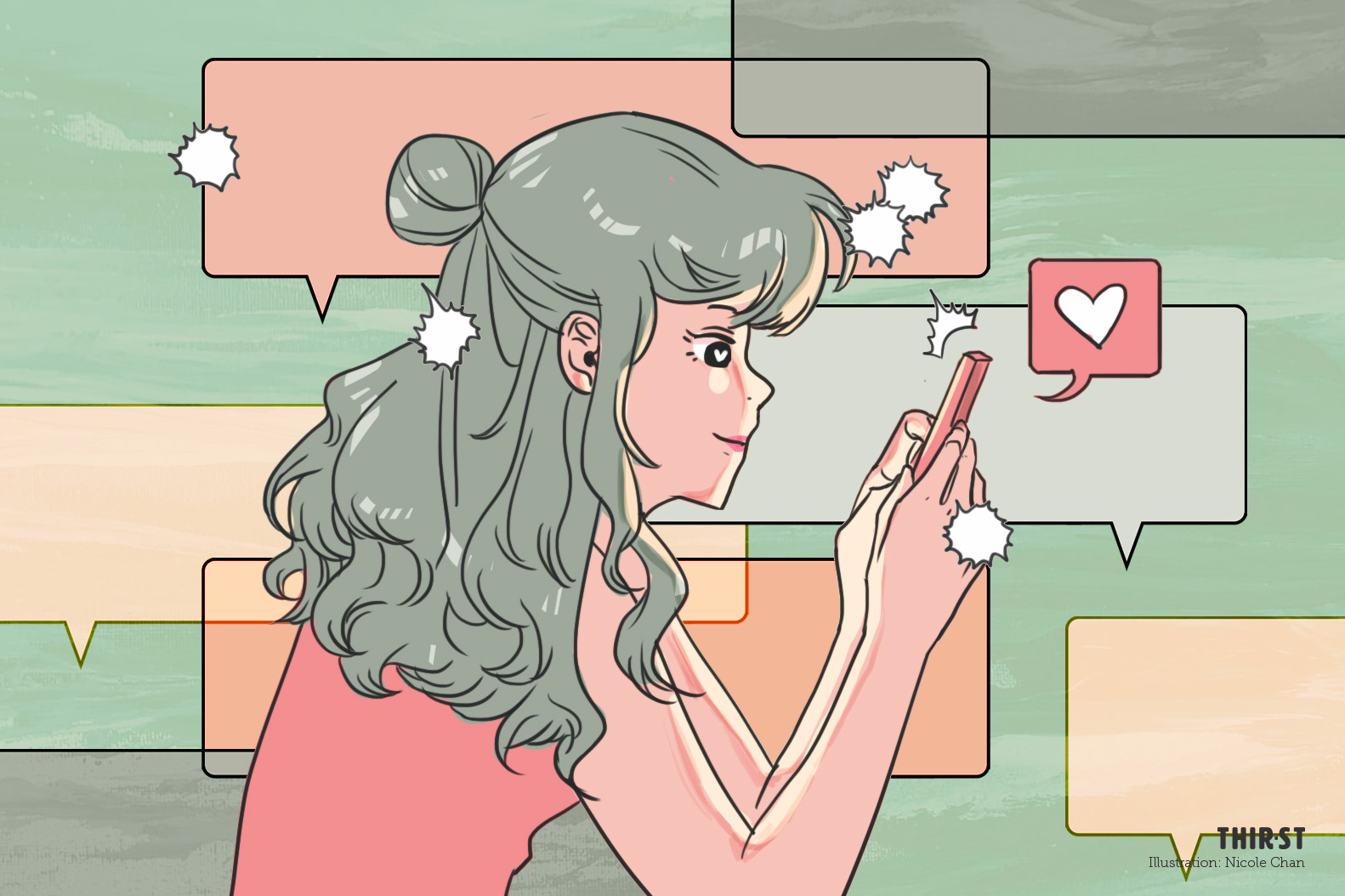One Friday night in my mid-20s, I was on my way to meet my girlfriends for steak after work when I found tears welling up as I scrolled through my phone.
“I think I am ready to join a nunnery,” I texted them. “Can we have a crying party?”
I was not actually dating anyone then, at least not officially, so I wondered why I still felt the sting of loss.
For most of that year, I had been texting a guy (let’s call him S for steak) every day – swapping YouTube links of favourite songs, strategically quoting Bon Iver lyrics at midnight, sending mundane updates of our days, which graduated to walls of texts detailing our childhood memories and heartbreaks.
One night he texted me: “I don’t understand why anyone would ever want to break up with you. You’re the ideal girlfriend.”
I must have subconsciously read it as “my ideal girlfriend”, which is how I ended up weeping while shoving prime cut beef into my mouth as I showed my girlfriends his latest WhatsApp message.
In it, S told me rather nonchalantly that he had kissed another girl while drunk – a single text that shattered the veneer of romantic possibility we had built over months of daily correspondence.
A MODERN MALADY
Six years after I sobbed into my steak, I recollected my experience with S to a good friend.
“Not the talking everyday non-boyfriend!” she exclaimed, referring to the phenomenon of texting someone almost daily with no definite conclusion to the state of your relationship. A familiar rite of passage for those in their 20s when it comes to modern dating in the age of technology.
Amused at the memories of my misspent youth, I shared a part of our conversation on my Instagram Stories (IGS). Someone who follows me sent me a direct message (DM) soon after:
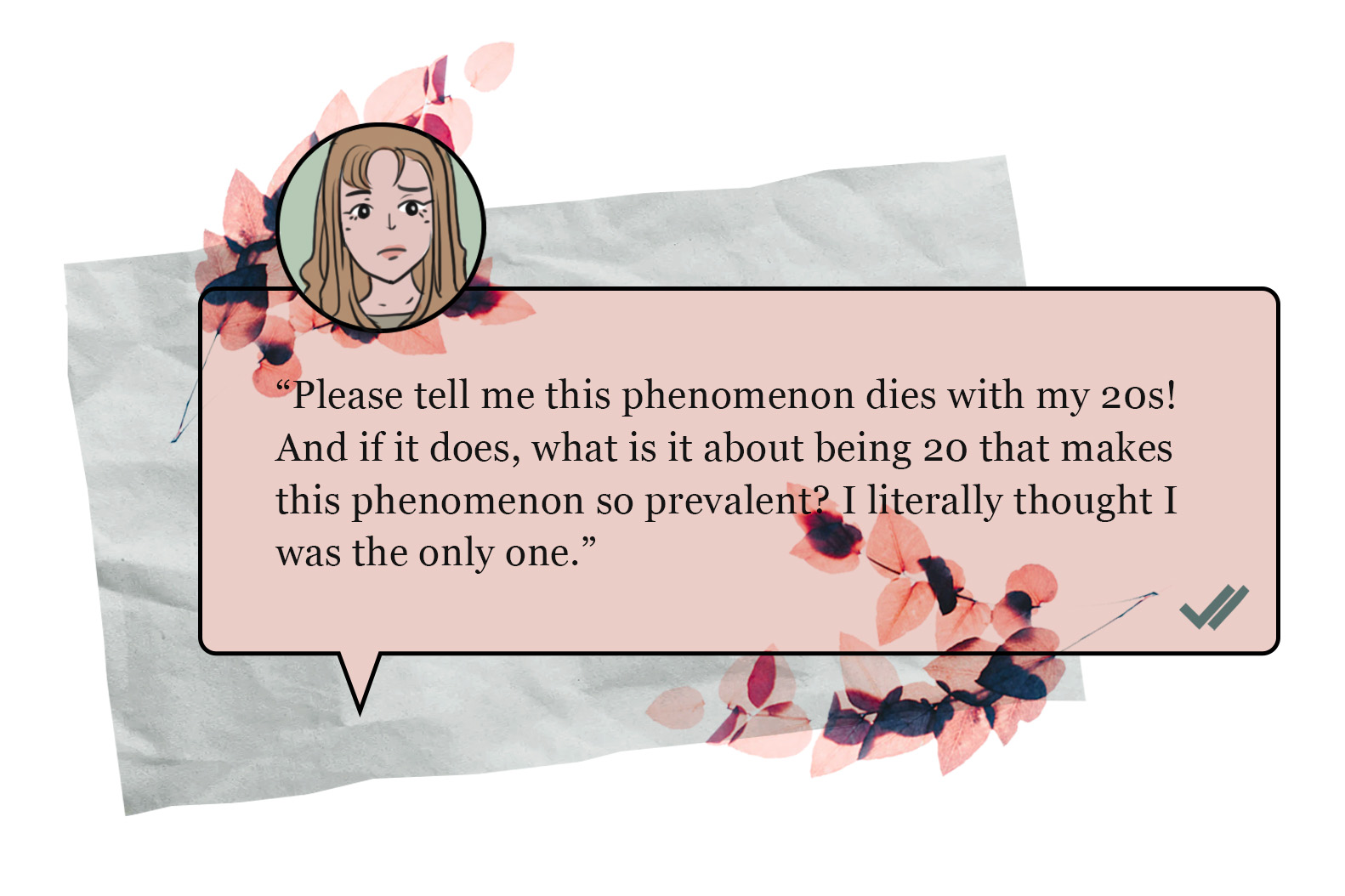
And then someone else did. And another, and another. It was a phenomenon of proportions I had not imagined.
With the rigour of an armchair anthropologist, I asked on IGS if anyone out there ever had a “talking everyday non-boyfriend or girlfriend” (henceforth known as TENB/G).
Hundreds of people, both men and women, responded within the 24-hour time limit, with 85% saying they’d been there and done that.
As the DMs continued to flood in, the results were glaringly clear; so I came up with a hashtag for the futile romantic endeavours of our generation: the #textingnomance (short for “no romance”).
Not to be confused with the “friend zone’’, a #textingnomance is characterised by either:
- Both parties not being on the same page. Perhaps X has been firmly placed in the friend zone by Y, but this has not been clearly communicated. This could be deliberate or inadvertent.
- Both X and Y are generally confused. In this case, no one really knows how to take it to the next level. Perhaps one party is hedging their heart for someone else or is practising a “collect then select” method (i.e. accumulating options before committing).
There can be male-female friendships which entail texting every day, but both parties are clear that they are firmly friends. This is not a #textingnomance.
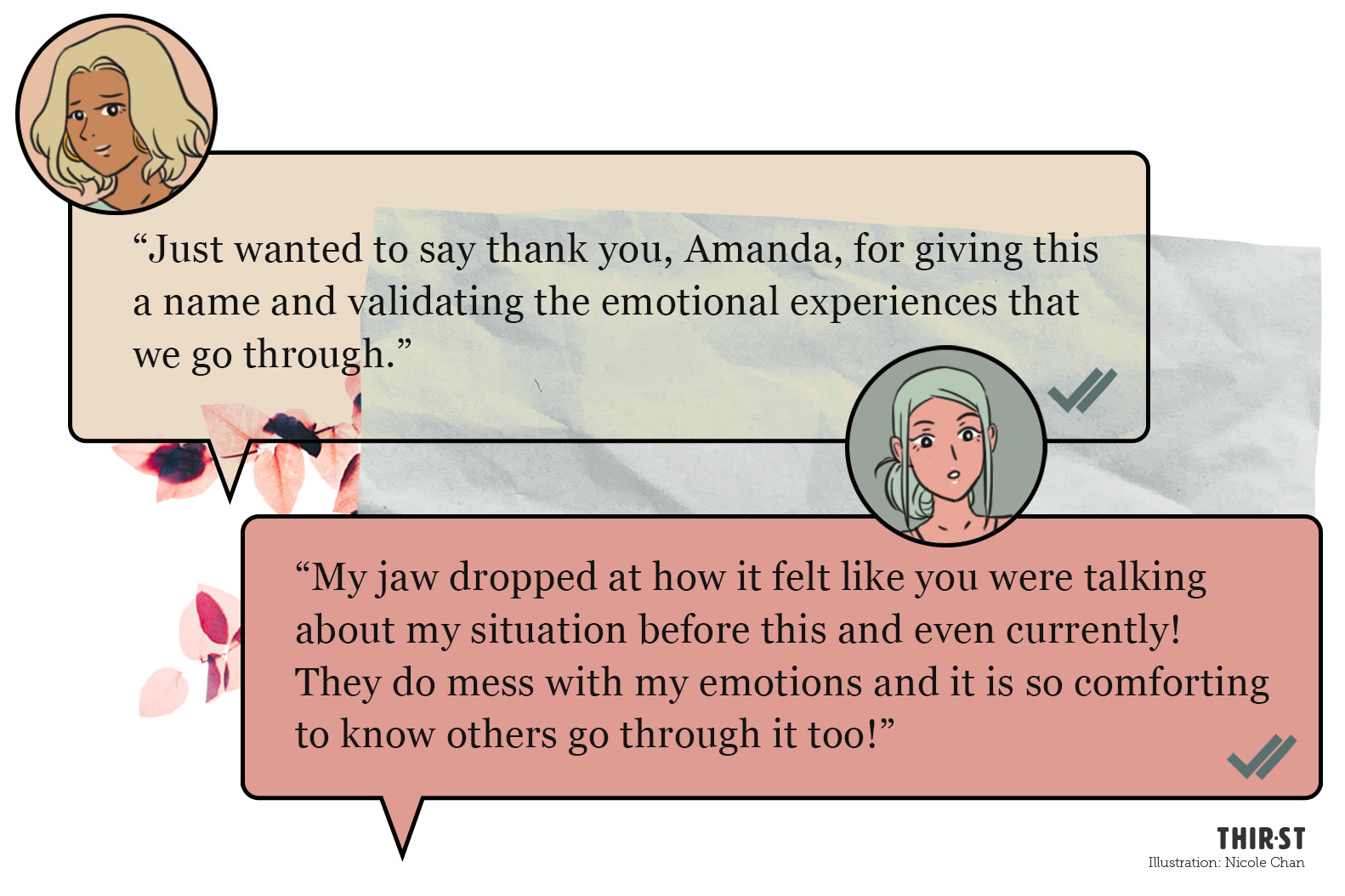
Imagine, I wrote in another IGS, impassioned by the mounting solidarity, the increase in productivity and general emotional health if we didn’t spend our time focus-grouping screenshots of WhatsApps from TENB/Gs, trying to decode every inflection of affection (e.g. “Is the sacred red emoji heart negated by the upside-down smiley? 
Whatever the category of #textingnomance, ain’t nobody got time for that.
CAUGHT IN A BAD NOMANCE
Most of us need our fair share of skinned knees before we learn how to set healthy boundaries, which is the best way to manage our emotional investment in any relationship – not just the romantic kind.
But there is no shame in the mistakes made. For all the times we have been hurt, we likely also have been the “talking everyday non-partner” to someone else. We all need to stop being signals officers leading folks down dead ends.
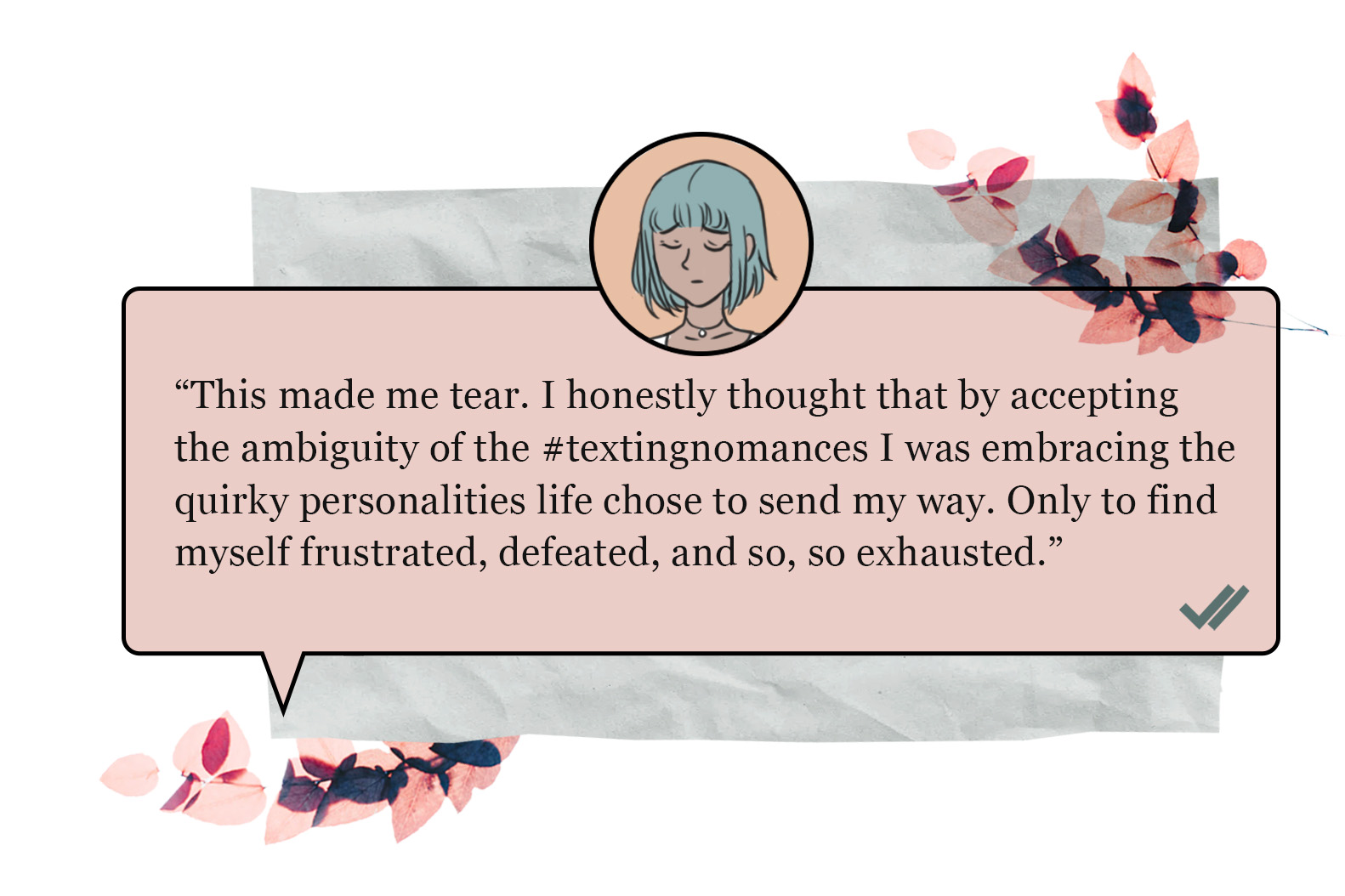
Many of us do this because we do not yet know how to deal with our loneliness. Again, this is something worth learning.
At the age of 30, I honestly am so tired half the time and have no emotional energy to be anyone’s manic pixie dream girl or intellectual courtesan.
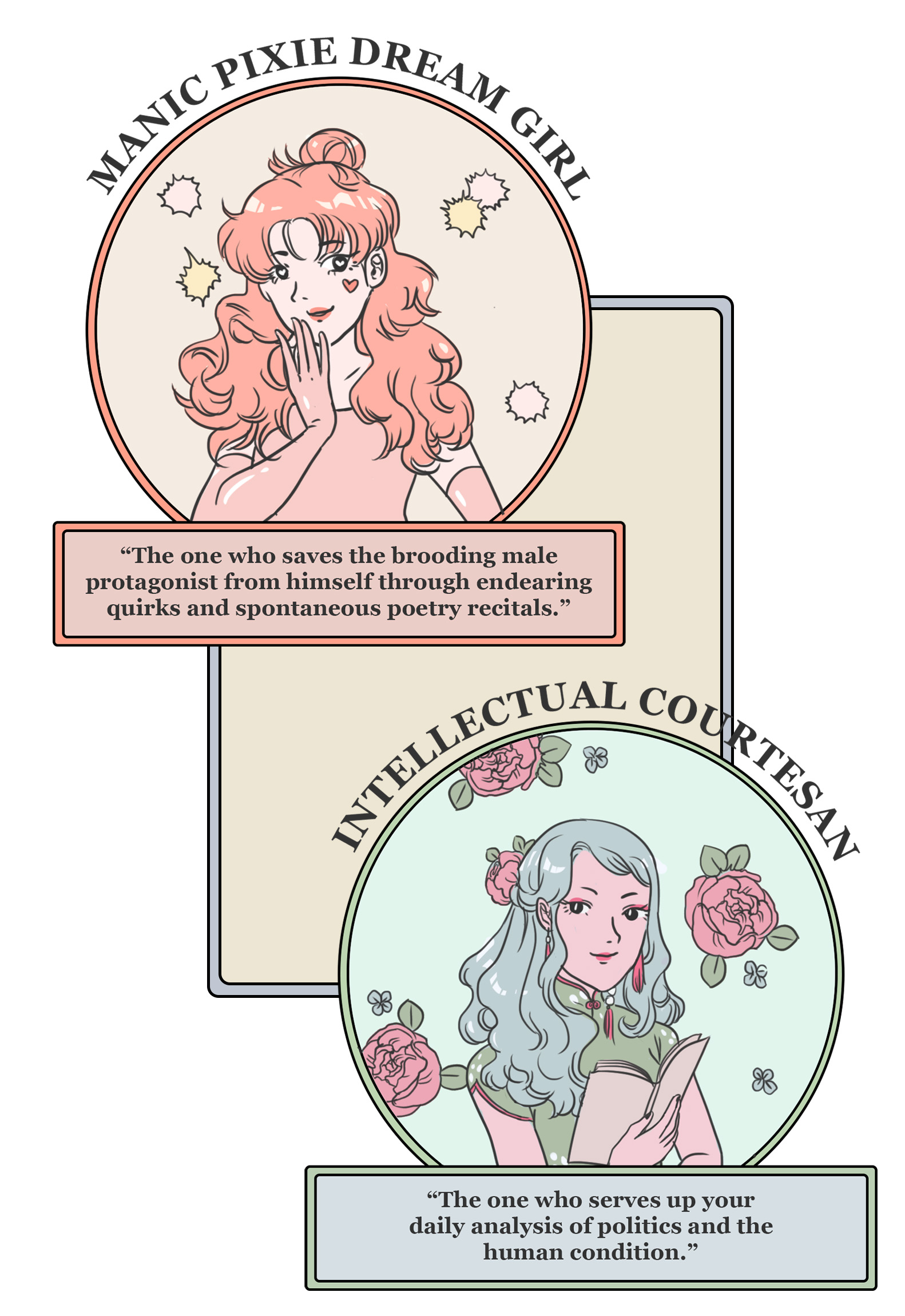
Looking back at the drama over my younger years, I don’t know how I ever engaged in #textingnomances, which involved chatting to some dude from “good morning” to “goodnight”.
I understand that the “talking” stage is a legitimate stage in dating rituals – but if you’re stuck in an infinite loop of texting, it becomes emotionally draining and can even chip away at your self-esteem. We should not be giving away our wit and emotions for free.
We are worth more than dashed hopes and throwaway DMs – we are worthy of love.
Good boundaries are a step of precaution I highly recommend because as much as we extol the virtues of being direct, there is also an understandable discomfort in asking someone to declare their intent every time, especially if you’ve just started talking.
The onus is easier placed on us to guard our hearts.
For myself, I have taken the general attitude of assuming nothing. So unless someone outwardly declares his feelings, I will take it that he just intends to be my platonic friend.
The boundary may look different to you, but we all have to know when to tap out.
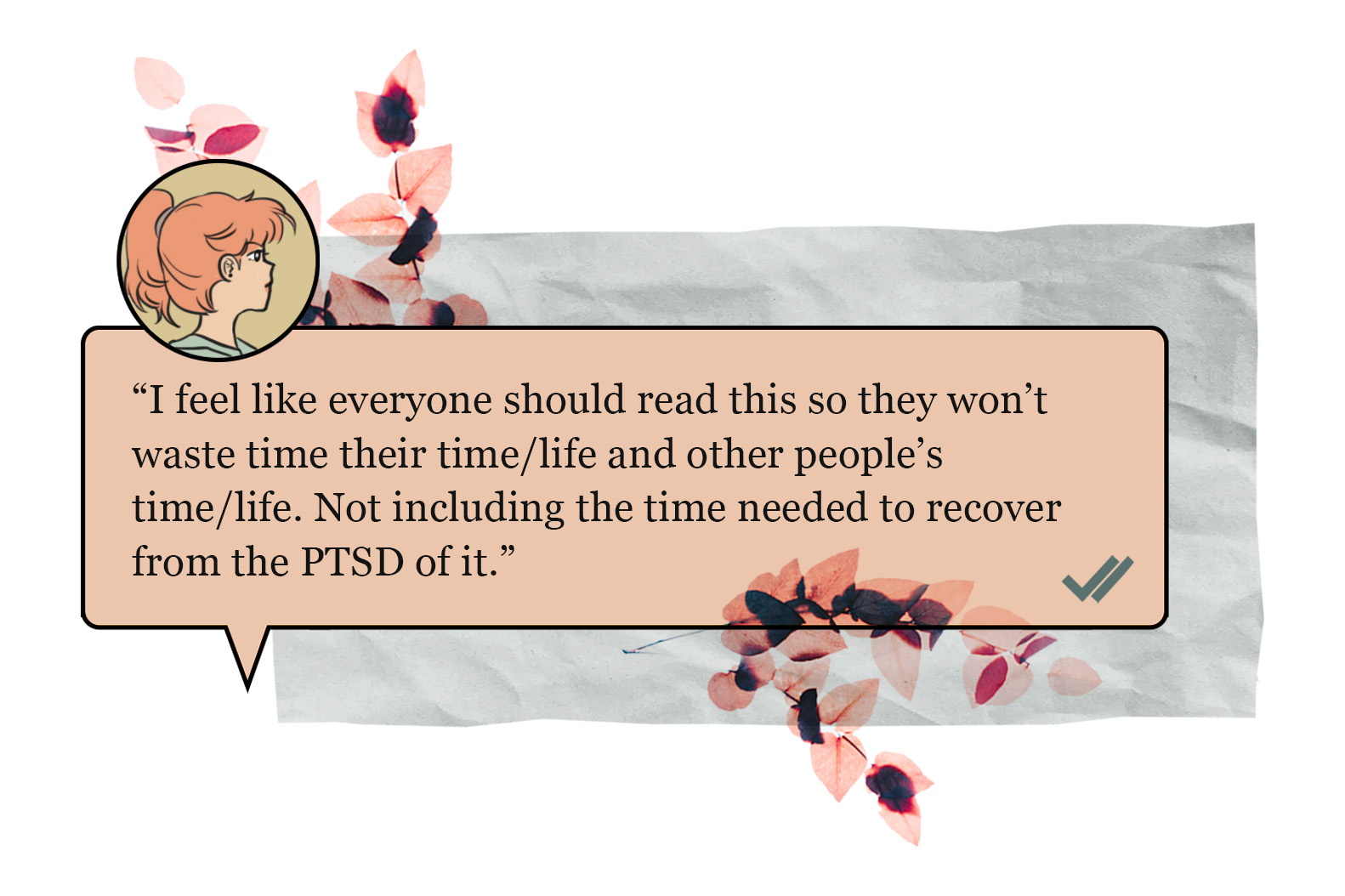
IS THIS REAL LOVE?
Before social distancing was made a “new normal” due to COVID-19, the ability to get to know someone through texting was the real “social distancer”, almost fully negating the need to interact face-to-face and take the time to grow in relational intimacy.
One of the great virtues of taking a budding online friendship to real life is the raising of the “barriers to entry” to more than just swiping open WhatsApp and shooting off a cheeky emoji.
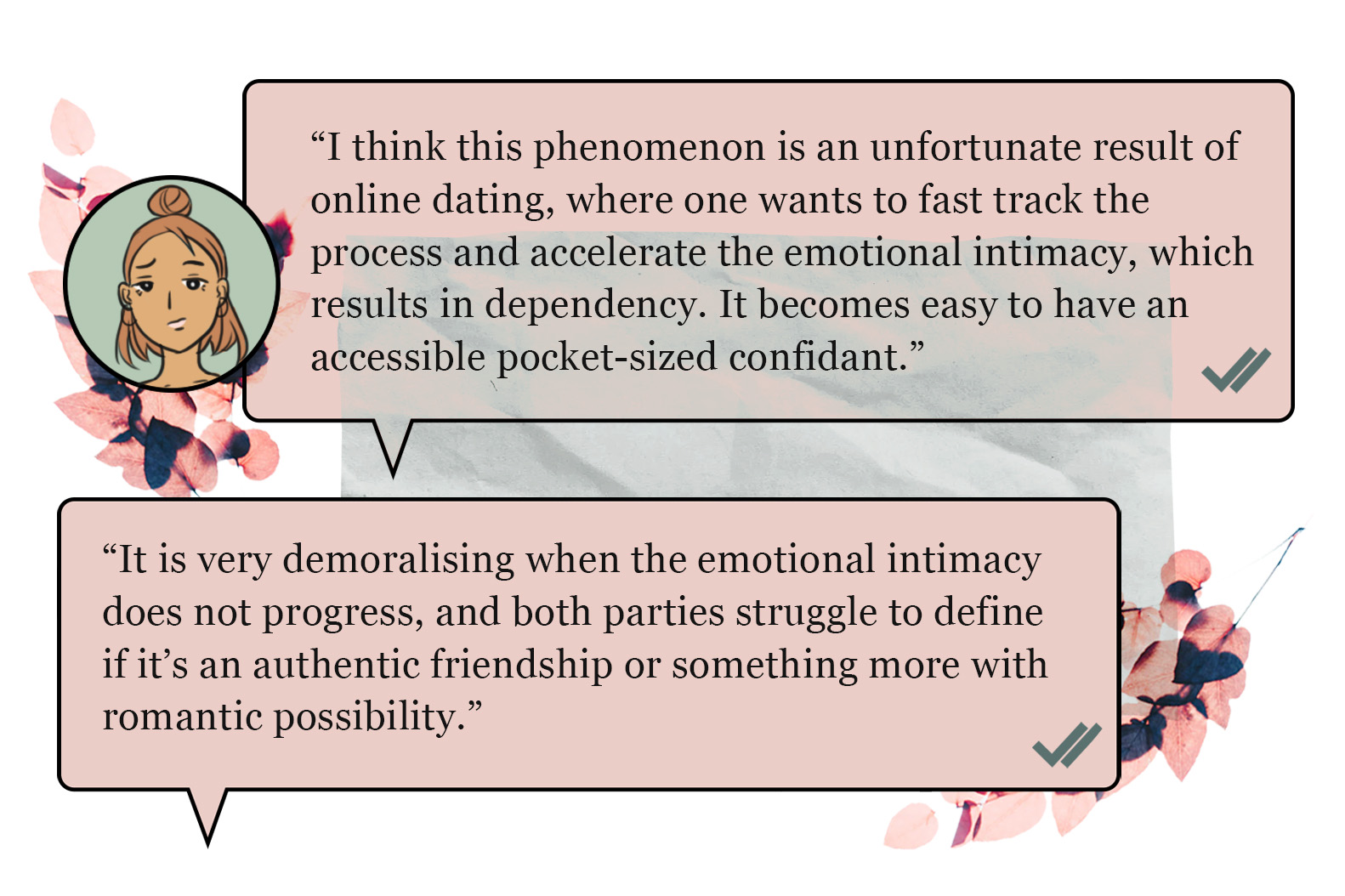
Real-life relationship building requires intentionality, which to me, is key. It shows respect for the other person, that you’re not taking their time, headspace or emotional labour for granted.
The problem is many of us don’t yet know what we want in a relationship, or would rather be in a pale version of one (i.e. texting someone every day) than deal with our loneliness.
We want a confidant without the commitment, the hero(ine) without the hard work.
But if we’re looking for a real relationship that could one day blossom into marriage, we need to take the time out to do this crucial work within ourselves.
If the seeking out of relationship is only to avoid the emptiness of the lonely hours, then we will only be seeking to serve ourselves, rather than the mutual growth and respect relationships should be grounded in.
If the attention found from another is simply to fill the questions of worth we have no personal answer for, then it’s too easy to turn the one giving it into a god – our source of peace and comfort.
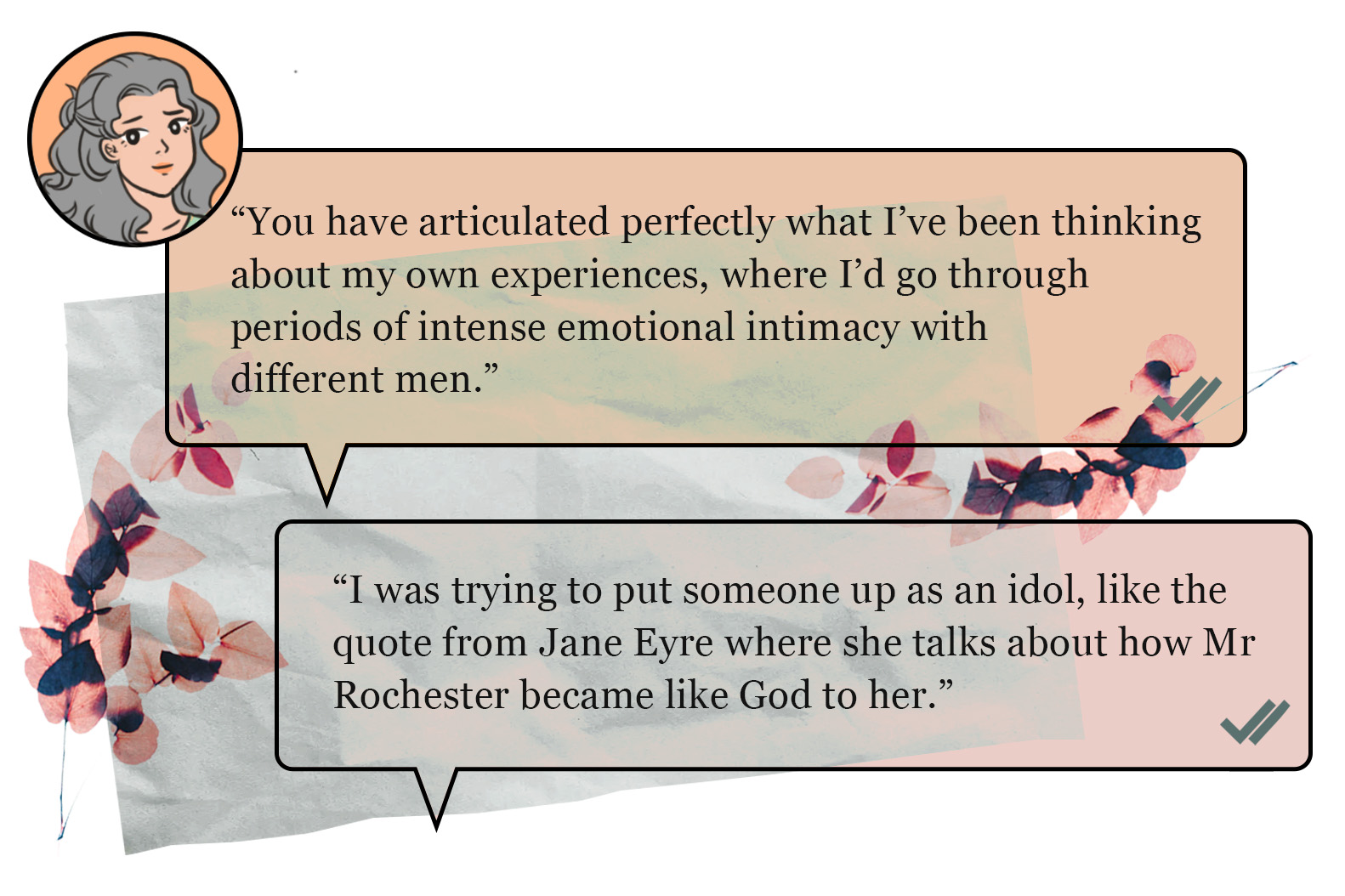
It is a deep human desire to be fully known and fully loved – hardwired into the relational beings we are created to be. We were not meant to feed on scraps of affection; we were created for fulfilling and abiding relationship.
It took me most of my 20s to realise that the soul-satisfying love I craved could not come from a man. Only God could see every wretched part and love me perfectly.
In experiencing this love, there is great freedom. There is no need for emotional crutches when your heart has found fullness.

Every time I went through the heartache of a #textingnomance, it made me more mindful to not inadvertently put someone else through the same, and to send clearer signals when I’m not interested.
But we are all human and prone to reading each other wrong, so the best we can do is to act in good faith, and consciously not string folks along to alleviate our own boredom or loneliness.
To those feeling sad at the thought of the TENB/G you might be currently facing or the #textingnomances of the past, don’t feel dumb or ashamed because you’re hurting when “nothing actually happened”, as several mournful DMs put it.
Don’t gaslight yourself. Something did happen and your heart has borne the weight of it. I will be the first to confess that many of the heartbreak poems in my book, Professions, came out of nomances.
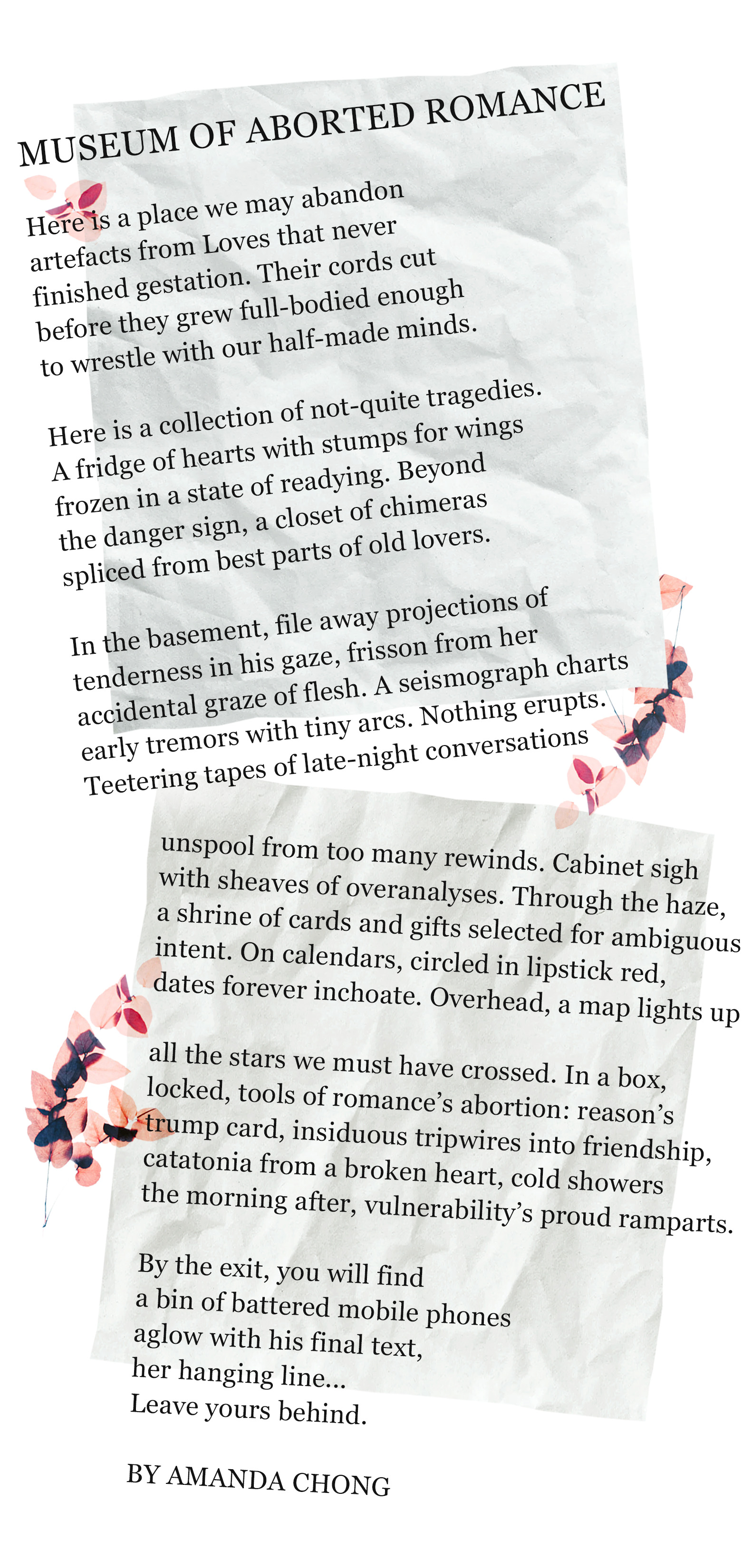
If we don’t heal properly from nomances, our wounds may actually leave us hungrier for affection than before, drawing us into subsequent relationships that are also wrong for us.
Instead, allow yourself however much time you need to row through the strange grief you feel towards a surer shore. Above all, may your heart be rooted and established in a love that does not disappoint.
Amanda is a lawyer and poet who co-founded ReadAble, a non-profit that equips children and migrant women from low-income families with literacy. She was baptised in 2017 and serves as a Mercy and Justice leader in Redemption Hill Church.
- Have you ever had a “texting everyday non-boyfriend or girlfriend”? What happened and how did it end?
- Do you have healthy boundaries in place for yourself? What are some of them?
- Do you believe you are worthy of love and respect?
- What do you want in a relationship? How have those principles aligned with your search for love?


